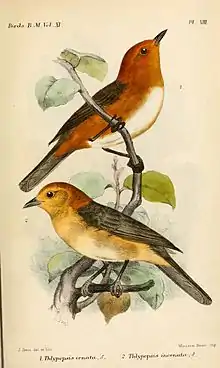Thlypopsis
Thlypopsis is a genus of birds in the tanager family Thraupidae.
| Thlypopsis | |
|---|---|
 | |
| Rufous-chested tanager (above); and buff-bellied tanager (below); illustration by Joseph Smit, 1886 | |
| Scientific classification | |
| Kingdom: | Animalia |
| Phylum: | Chordata |
| Class: | Aves |
| Order: | Passeriformes |
| Family: | Thraupidae |
| Genus: | Thlypopsis Cabanis, 1851 |
| Type species | |
| Nemosia sordida d'Orbigny & Lafresnaye, 1837 | |
| Species | |
|
See text | |
Taxonomy and species list
The genus Thlypopsis was introduced by the German ornithologists Jean Cabanis in 1851.[1] The name combines the Ancient Greek thlupis, a word for an unknown small bird, and opsis meaning "appearance".[2] The type species was subsequently designated as the orange-headed tanager (Thlypopsis sordida).[3][4]
The chestnut-headed tanager was formerly placed in the genus Pyrrhocoma and the superciliaried hemispingus in Hemispingus. A molecular phylogenetic study published in 2014 found that these two species were embedded in Thlypopsis.[5]
The genus contains eight species:[6]
| Image | Scientific name | Common Name | Distribution |
|---|---|---|---|
.jpg.webp) | Thlypopsis fulviceps | Fulvous-headed tanager | Venezuelan Coastal Range and far northern Colombia. |
| Thlypopsis inornata | Buff-bellied tanager | Peru and far southern Ecuador | |
.jpg.webp) | Thlypopsis sordida | Orange-headed tanager | Argentina, Bolivia, Brazil, Colombia, Ecuador, Paraguay, Peru, and Venezuela. |
 | Thlypopsis pyrrhocoma (formerly assigned to Pyrrhocoma) | Chestnut-headed tanager |
east Paraguay, northeast Argentina, and south Brazil |
 | Thlypopsis ruficeps | Rust-and-yellow tanager | Argentina, Bolivia, and Peru |
 | Thlypopsis superciliaris (formerly assigned to Hemispingus) | Superciliaried hemispingus | Venezuela and Bolivia |
 | Thlypopsis ornata | Rufous-chested tanager | Ecuador, Peru and southwestern Colombia |
 | Thlypopsis pectoralis | Brown-flanked tanager | Peru |
References
- Cabanis, Jean; Heine, Ferdinand (1860). Museum Heineanum : Verzeichniss der ornithologischen Sammlung des Oberamtmann Ferdinand Heine, auf Gut St. Burchard vor Halberstadt (in German). Volume 1. Halberstadt: R. Frantz. p. 138.
- Jobling, James A. (2010). The Helm Dictionary of Scientific Bird Names. London: Christopher Helm. p. 384. ISBN 978-1-4081-2501-4.
- Gray, George Robert (1855). Catalogue of the Genera and Subgenera of Birds Contained in the British Museum. London: British Museum. p. 74.
- Paynter, Raymond A. Jr, ed. (1970). Check-List of Birds of the World. Volume 13. Cambridge, Massachusetts: Museum of Comparative Zoology. p. 268.
- Burns, K.J.; Shultz, A.J.; Title, P.O.; Mason, N.A.; Barker, F.K.; Klicka, J.; Lanyon, S.M.; Lovette, I.J. (2014). "Phylogenetics and diversification of tanagers (Passeriformes: Thraupidae), the largest radiation of Neotropical songbirds". Molecular Phylogenetics and Evolution. 75: 41–77. doi:10.1016/j.ympev.2014.02.006.
- Gill, Frank; Donsker, David; Rasmussen, Pamela, eds. (July 2020). "Tanagers and allies". IOC World Bird List Version 10.2. International Ornithologists' Union. Retrieved 17 October 2020.
This article is issued from Wikipedia. The text is licensed under Creative Commons - Attribution - Sharealike. Additional terms may apply for the media files.